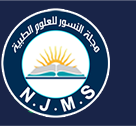Peer Review Process
Peer review is employed to evaluate the quality of manuscripts before publication. Upon submission, all manuscripts are initially assessed by the Editor-in-Chief to ensure they meet the criteria for submission to N.J.M.S. If deemed suitable, potential peer reviewers within the relevant field of research are selected by the editorial team to evaluate the manuscripts and provide recommendations. N.J.M.S. employs a double-blind review process, ensuring that reviewers do not know the identities of the authors, and vice versa.
Peer reviewers, who are experts in their respective fields, volunteer their time to offer constructive feedback to improve the manuscripts they review. Upon completion of the peer review process and receipt of reviewers' comments, the Editor-in-Chief makes a decision on the manuscript, which may include acceptance, major revision, minor revision, or rejection.
Authors are typically given one month to prepare revisions based on the reviewers' comments. Any revisions should be clearly highlighted and easily identifiable by the editors and reviewers. Authors are also expected to provide a detailed response to reviewers' comments, explaining any changes made.
Revised manuscripts that do not meet N.J.M.S.'s requirements may be returned to authors with requests for corrections and resubmission. Some manuscripts may undergo multiple rounds of peer review. Ultimately, the Editor-in-Chief holds the final decision regarding the acceptance or rejection of manuscripts, and their decision is considered final.

